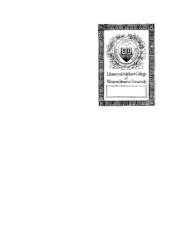You also want an ePaper? Increase the reach of your titles
YUMPU automatically turns print PDFs into web optimized ePapers that Google loves.
30<br />
and his own banishment in the year 9,83 As the passage from<br />
.. If Festus, p. 347a25, "ubi nunc est aedis Concordiae inter Capitolium<br />
et Forum", is copied from Verrius without interpolation and refers to<br />
the temple after its restoration in A. D, 10, or one year after Ovid's<br />
banishment, we have here sufficient evidence that the de- Verborum Significatu<br />
was published too late for Ovid's use. R. Merkel, in the Prolegomena<br />
to his edition of the Fasti, p, XCV, not only uses this reference<br />
as an argument, but makes capital of the fact that Festus seven<br />
times draws on Ateius Capito in matters of pontifical law, who was<br />
probably born about the year 34 B. C. and died in 22 A. D.; (see Tac.<br />
Ann., III, 75, Frontinus Aq. 102. Teuffel and Schwabe Hist. of Roman Litemtll're,<br />
Warr's translation. I, 265, and.Schanz 2 I, p. 532), for, if Verrius<br />
drew on him, how could the de Verborum Sigtlificatu have been written<br />
untit Ateius had become old and mature enough to publish a learned<br />
work? Ateius wrote two hundred and sixty-one books on human and<br />
divine law, and if he followed Varro's order of writing those on human<br />
law first, it would place the date of his work on pontifical law so much<br />
later. Suetonius (de Grammaticis et Rhetoribus 17) says of Verrius Flaccus:<br />
"Decessit aetatis exactae sub Tiberio", Schanz 2 I, p. 506, says: "Wahrscheinlich<br />
fallt das Werk (de Verborum Significatu) in die Regierungszeit<br />
des Tiberius". "When Ovid began the Fasti cannot be definitely determined,"<br />
says Schanz, 2 I, p, 308, who adds: "at any rate after the love<br />
poems were finished. The 4th book falls in the period following the<br />
conflagration on the Palatine because of which a restoration of the temple<br />
of Magna Mater by Augustus became necessary", in the year 3 A. D.<br />
(See Fasti IV, 348), "The nature of the work prevented its being composed<br />
in a continuous chain", Peter, in the introduction to his edition,<br />
pp. 10-11, says that at any rate the composition fell some time after<br />
Augustus' restoration of the Julian Kalender in 8 B. C., and Book IV<br />
after 3 A.. D. In a footnote, however (n. 4), he asserts that the question<br />
has in the main been solved by Merkel's industry and acumen. Merkel<br />
believes that Ovid began his work in the year 755 A.. U. C. (p. X C I V<br />
and C C L V). He was banished in 9 A. D., and seems to have done<br />
little with the poem after that date, beyond revising Book 1. It is, therefore,<br />
highly improbable that the de Verborum Significatu was written<br />
before his banishment. On the other hand Franke, pp. 4-5, shows convincing<br />
evidence that Verrius' Fasti were written between A. U. C. 757<br />
and 759. As Ovid undoubtedly used these as a source (see n. 82, quotation<br />
from Schanz) and we have seen above that for another reason<br />
Ovid's 4th book must have been written after 3 A. D. or 756, surely it<br />
seems safe to conjecture that his poem, except its revised portions, was<br />
composed in the four or five years between the completion of Verrius'<br />
Fasti and his own banishment. I am indebted to Professor Kirby Flower<br />
Smith for the suggestion that the publication of Verrius' book would<br />
naturally stimulate Ovid to a similar essay in the field 0 f poetry.
















